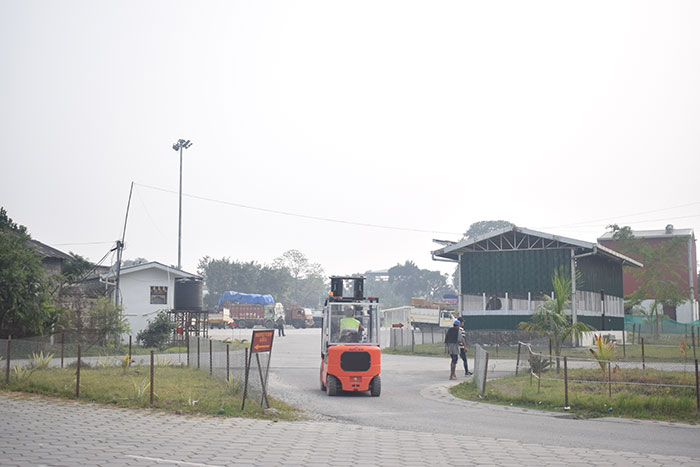Former loaders asked to work until mechanisation transition completes
Rajesh Rai | Phuentsholing
Just three days into its operation, the mechanised loading, unloading and transhipment at the Mini Dry Port (MDP) system in Phuentsholing failed to provide expected service.
The mechanised system, which is outsourced to a private firm, didn’t have enough loaders and works were heavily disrupted. The busy MDP was empty yesterday.
Due to the problem, the number of vehicles entering MDP for clearance and transhipment reduced drastically. Not a single vehicle entered the MDP yesterday.
The government had recently outsourced loading, unloading and transhipment works to a private firm, Dhendup Enterprise, to bring down the cost of loaders’ charge by a huge margin with the mechanised system in place.
The firm had recruited 34 loaders, mostly former MDP loaders, but most left by December 18. Yesterday, it had just eight loaders. All were new recruits.
As import vehicles were not getting cleared on time, 100s of vehicles were also stranded across the border as the registration for import vehicles was suspended.
Usually, with the old labour-intensive system, customs cleared about 60-70 vehicles per day.
With the mechanisation, on December 17, only 33 vehicles were cleared and 29 vehicles that had entered the port remained stranded. On December 16, 33 of the 59 vehicles that entered the port were cleared.
Importers said they paid Nu 2,000 per truck per day as demurrages both in Jaigaon and MDP.
With the mechanisation, Dhendup Enterprise was expected to reduce the turnaround time required to clear goods and commodities from the MDP. Transshipping goods from a six-wheeler, which took at least a few hours was expected to take just take 30 minutes. And the MDP would cater to 300 trucks per day, it was expected.
The firm would charge Nu 1,890 for a six-wheeler truck with a carrying capacity of about 10-12 metric tonnes (MT), compared to the government approved rate of Nu 3,000 per truck. The approved rate of transshipping, for instance, a brick was Nu 1, which was expected to reduce to Nu 0.54.
The charges of Nu 15,000 per truck to transship bamboos would also come down to Nu 1,200 approximately.
Along with the demurrage cost, the transhipment vehicles that came down to MDP with escorts from Sorchen also had to wait.
Without the loads, drivers returned to Sorchen to spend the night and again come the next day. Drivers from across the border bringing the imported goods also had to wait at MDP.
One importer, Doley, who was expecting three vehicles said the situation was chaotic.
The problem started since December 16 and she spent more than Nu 6,000 for demurrages.
“I had to even take food to the drivers from across the border as they had to wait at the MDP as the vehicles got stuck,” she said.
Doley said the problem at MDP had been since the beginning with regards to cost of the loaders’ charges. However, it was not problematic and paying a little extra was not an issue since most of the loaders were Bhutanese youth.
Although Doley was able to manage to clear two trucks, the importer was still waiting for her third truck yesterday evening.
RC Furniture’s proprietor in Thimphu said that he had two trucks of consignments coming.
“The first vehicle was supposed to get cleared on December 17, reach Thimphu the same day, and the vehicle was supposed to return Phuentsholing for another consignment,” he said.
“But it didn’t happen as expected.”
The managing director of Dhendup Enterprise said they are having a tough time.
“When we make a transition from an old to a new system, we cannot go 100 percent,” he said.
“We took the MDP fully on December 16. I knew something was wrong right from the beginning.”
He explained loaders started to quit after they were put into a hotel. The firm had hired hotel rooms to keep loaders but they said they can’t stay in a crammed space because they are used to living in school facilities and they were upset. “They had their own system. They were earning from Nu 3,000 to Nu 7,000 per day, working only three to four hours a day,” he said, adding that the loaders were making money because of the high charges they charged.
“They started complaining from December 17. They were not working. They started avoiding work and said they were tired. And we couldn’t push them.”
Dhendup Enterprise had initially planned to recruit about 30 loaders, pay each of them Nu 1,000 per day, and go fully operational from December 15.
Meanwhile, customs office in Phuentsholing has issued a letter to the loaders’ representative, Sonam Wangchuk, and asked him to deploy loaders until the transition period of mechanisation.
“I am recruiting 70 loaders,” Sonam Wangchuk said.
Although the mechanised system was expected to bring efficiency and reliability to the handling of the MDP, the loaders were not keen with the idea since the beginning, as they would lose their jobs and earning opportunities.
Prior to MDP being outsourced, there were 146 loaders, all men, ranging from 18 years old to 50 years.
Dhendup Enterprise managing director said they have been given 30 days to get fully operational. During this time, the loaders, who will resume work today will work independently.
“We are fighting an uphill task but we are hopeful.”


